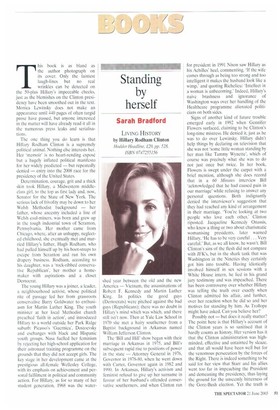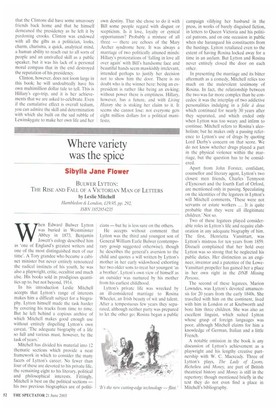Standing by herself
Sarah Bradford
LIVING HISTORY by Hillary Rodham Clinton Hodder Headline. £20. pp. 528, ISBN 0747255156 This book is as bland as the author photograph on its cover. Only the faintest laugh-lines but no real wrinkles can be detected on the 50-plus Hillary's impeccable cheeks, just as the blemishes on the Clinton presidency have been smoothed out in the text. Monica Lewinsky does not make an appearance until 440 pages of often turgid prose have passed, hut anyone interested in the matter will have already read it all in the numerous press leaks and serialisations.
The one thing you do learn is that Hillary Rodham Clinton is a supremely political animal. Nothing else interests her. Her 'memoir' is no heart-rending exposé but a hugely inflated political manifesto for her widely predicted — but repeatedly denied — entry into the 2008 race for the presidency of the United States.
Determination, courage, grit and a thick skin took Hillary, a Midwestern middleclass girl, to the top as first lady and, now. Senator for the State of New York. The serious lack of frivolity may be down to her Welsh Methodist background — her father, whose ancestry included a line of Welsh coal-miners, was born and grew up in the tough industrial town of Scranton. Pennsylvania. Her mother came from Chicago, where, after an unhappy, neglected childhood, she eventually met and married Hillary's father, Hugh Rodham, who had pulled himself up by his hoot-straps to escape from Scranton and run his own drapery business. Rodham, according to his daughter, was a 'rock-ribbed conservative Republican', her mother a homemaker with aspirations and a closet Democrat.
The young Hillary was a joiner, a leader, a neighbourhood activist, whose political rite of passage led her from grassroots conservative Barry Goldwater to enthusiasm for Martin Luther King. The youth minister at her local Methodist church preached 'faith in action', and introduced Hillary to a world outside her Park Ridge suburb: Picasso's 'Guernica', Dostoevsky and exchanges with black and Hispanic youth groups. Nasa fuelled her feminism by rejecting her high-school application for their astronaut training programme on the grounds that they did not accept girls. The key stage in her development came at the prestigious all-female Wellesley College, with its emphasis on achievement and personal fulfilment in political and community action. For Hillary, as for so many of her student generation, 1968 was the water
shed year between the old and the new America — Vietnam, the assassinations of Robert F. Kennedy and Martin Luther King. In politics the good guys (Democrats) were pitched against the bad guys (Republicans); there was no doubt in Hillary's mind which was which, and there still isn't now. Then at Yale Law School in 1970 she met a hairy southerner from a Baptist background in Arkansas named William Jefferson Clinton.
The 'Bill and Hill' show began with their marriage in Arkansas in 1975, and Bill's subsequent rapid rise to positions of power in the state — Attorney General in 1976, Governor in 1978-80, when he went down with Carter, Governor again in 1982 and 1990. In Arkansas, Hillary's activism and feminist refusal to give up her surname in favour of her husband's offended conservative southerners, and when Clinton ran
for president in 1991 Nixon saw Hillary as his Achilles' heel, commenting, 'If the wife comes through as being too strong and too intelligent it makes the husband look like a wimp,' and quoting Richelieu: 'Intellect in a woman is unbecoming.' Indeed, Hillary's naive brashness and ignorance of Washington ways over her handling of the Healthcare programme alienated politicians on both sides.
Signs of another kind of future trouble emerged early in 1992 when Gennifer Flowers surfaced, claiming to be Clinton's long-time mistress. He denied it, just as he was to do over Lewinsky. Hillary didn't help things by declaring on television that she was not 'some little woman standing by her man like Tammy Wynette', which of course was precisely what she was to do not just once but twice. In her book, Flowers is swept under the carpet with a brief mention, although she does record that in a 60 Minutes interview Bill 'acknowledged that he had caused pain in our marriage' while refusing to answer any personal questions. Both indignantly denied the interviewer's suggestion that they had reached any kind of arrangement in their marriage. 'You're looking at two people who love each other,' Clinton riposted. Jacqueline Kennedy Onassis, who knew a thing or two about charismatic womanising presidents, later warned Hillary, 'He has to be very careful. .. Very careful.' But, as we all know, he wasn't. Bill Clinton's sins of the flesh did not compare with JFK's, but in the shark tank that was Washington in the Nineties they certainly got him into trouble. Having idiotically involved himself in sex sessions with a White House intern, he lied in his grand jury testimony and was impeached. There has been controversy over whether Hillary was telling the truth over exactly when Clinton admitted his affair, and further, over her reaction when he did so and her motives for standing by him. As Trollope might have asked. Can you believe her?
Possibly not — but does it really matter? The point here is that Hillary's account of the Clinton years is so sanitised that it hardly counts as history. Her version has it that the Clinton administration was highminded, effective and untainted by sleaze, and that all would have been well but for the venomous persecution by the forces of the Right. There is indeed something to be said for her view that Starr and his allies went too far in impeaching the President and demeaning the presidency, thus laying the ground for the unseemly bitterness of the Gore-Bush election. Yet the truth is that the Clintons did have some unsavoury friends back home and that he himself demeaned the presidency as he left it by pardoning crooks. Clinton was endowed with all the gifts as a politician, looks, charm, charisma, a quick. analytical mind, a human ability to reach out to all sorts of people and an unrivalled skill as a public speaker, but it was his lack of a personal moral compass that in the end destroyed the reputation of his presidency.
Clinton, however, does not loom large in this book; he will undoubtedly have his own multimillion dollar tale to tell. This is Hillary's ego-trip, and it is her achievements that we are asked to celebrate, Even if the cumulative effect is overall tedium, you can admire the skill and determination with which she built on the sad rubble of Lewinskygate to make her own life and her
own destiny. That she chose to do it with Bill some people regard with disgust or scepticism. Is it love, loyalty or cynical opportunism? Probably a mixture of all three — there are echoes of the Mary Archer syndrome here. It was always a marriage of two politically attuned minds: Hillary's protestations of 'falling in love all over again' with Bill's handsome face and beautiful hands seem mawkishly irrelevant, intended perhaps to justify her decision not to show him the door. There is no doubt who is the winner here: being an expresident is rather like being an ex-king; without power there is emptiness. Hillary, however, has a future, and with Living History she is staking her claim to it. It seems she cannot lose: not everyone gets eight million dollars for a political manifesto.



































































































 Previous page
Previous page